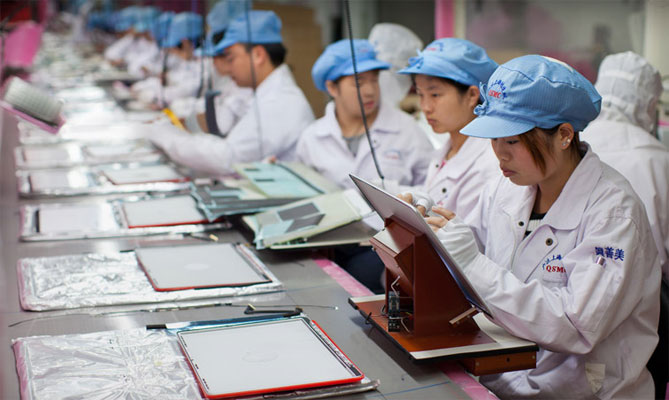Foxconn Workers Striking Over iPhone 5 Workload, Group Says
Sign up to receive The Snapshot, a free special dispatch from Laptop Mag, in your inbox.
You are now subscribed
Your newsletter sign-up was successful
Three to four thousand workers on the iPhone 5 production line at Foxconn's Zhengzhou plant have gone on strike, according to a report from China Labor Watch. In a press release issued this afternoon, Li Qiang, the activist group's executive director, claimed that the strike is ongoing and involves mostly workers from the OQC (onsite quality control) line.
Qiang claims that the strike began because of conflicts between workers and quality control agents that lead to physical violence. Qiang's sources told him that a fight between the two groups led to damage in an inspection room and several injuries that were serious enough to require hospitalization.
The inspectors are apparently under a great deal of pressure to ensure that the iPhone 5s Foxconn produces are free from scratches on their frames and back covers and that they meet strict 0.2 millimeter indentation standards. Qiang says that these rising standards from Apple, an agressive inspection regime and inadequate worker training on how to meet these new expections have created a volatile situation which led to the strike. According to China Labor Watch, workers are also upset that they were not allowed to take National Day, an important Chinese holiday, off from work.
We have not yet seen any independent news articles confirming that this strike took or is currently taking place. However, we are reaching out to Apple for comment and will keep you updated as new information becomes available.
To provide more details, we've included China Labor Watch's press release below:
(New York) China Labor Watch (CLW) announced that at 1:00PM on October 5 (Beijing time), a strike occurred at Foxconn’s Zhengzhou factory that involved three to four thousand production workers. In addition to demanding that workers work during the holiday, Foxconn raised overly strict demands on product quality without providing worker training for the corresponding skills. This led to workers turning out products that did not meet standards and ultimately put a tremendous amount of pressure on workers. Additionally, quality control inspectors fell into to conflicts with workers and were beat up multiple times by workers. Factory management turned a deaf ear to complaints about these conflicts and took no corrective measures, resulting in a work stoppage by quality control inspectors.
The majority of workers who participated in this strike were workers from the OQC (onsite quality control) line. According to workers, multiple iPhone 5 production lines from various factory buildings were in a state of paralysis for the entire day. It was reported that factory management and Apple, despite design defects, raised strict quality demands on workers, including indentations standards of 0.02mm and demands related to scratches on frames and back covers. With such demands, employees could not even turn out iPhones that met the standard. This led to a tremendous amount of pressure on workers. On top of this, they were not permitted to have a vacation during the holiday. This combination of factors led to the strike.
Sign up to receive The Snapshot, a free special dispatch from Laptop Mag, in your inbox.
That quality control inspectors would also strike is of no surprise. According to workers, there was a fight between workers and quality control inspectors in area K that led to the damage in inspection room CA, the injury of some people, and the hospitalization of others. After this, another similar incident occurred in area K, once again leading to quality control inspectors getting beat up. Yesterday, inspectors in area L received physical threats. When inspectors reported these issues to factory management, the management simply ignored and turned their back on the issue. For these reasons, all day and night shift inspectors carried out a work stoppage today that paralyzed the production lines.
CLW Executive Director Li Qiang said, “This strike is a result of the fact that these workers just have too much pressure.”


